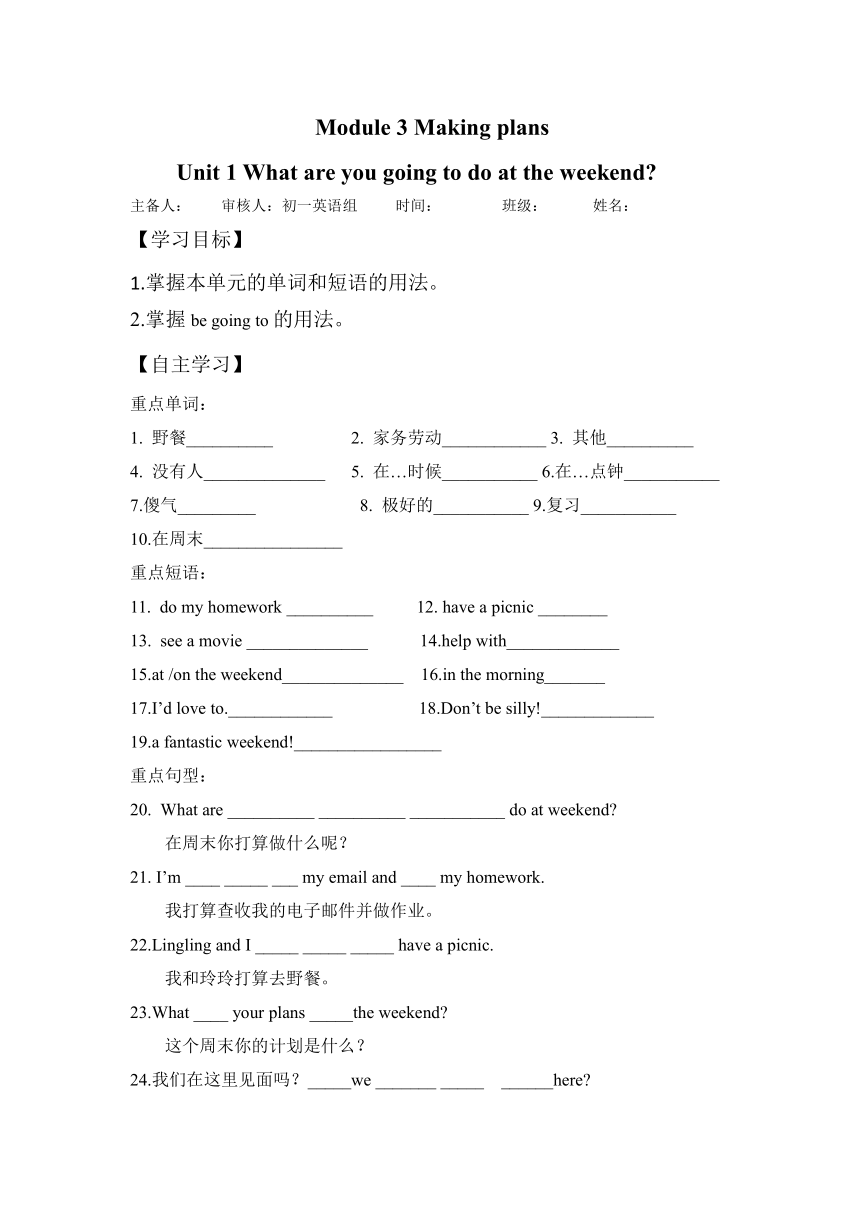
Module 3 Making plans Unit 1 What are you going to do at the weekend 主备人: 审核人:初一英语组 时间: 班级: 姓名: 【学习目标】 1.掌握本单元的单词和短语的用法。 2.掌握be going to的用法。 【自主学习】 重点单词: 野餐_____ 2. 家务劳动_____ 3. 其他_____ 没有人_____ 5. 在…时候_____ 6.在…点钟_____ 7.傻气_____ 8. 极好的_____ 9.复习_____ 10.在周末_____ 重点短语: do my homework _____ 12. have a picnic _____ see a movie _____ 14.help with_____ 15.at /on the weekend_____ 16.in the morning_____ 17.I’d love to._____ 18.Don’t be silly!_____ 19.a fantastic weekend!_____ 重点句型: What are _____ _____ _____ do at weekend 在周末你打算做什么呢? 21. I’m ____ _____ ___ my email and ____ my homework. 我打算查收我的电子邮件并做作业。 22.Lingling and I _____ _____ _____ have a picnic. 我和玲玲打算去野餐。 23.What ____ your plans _____the weekend 这个周末你的计划是什么? 24.我们在这里见面吗?_____we _____ _____ _____here 【学习过程】 1. 连线题(Activity 1): 2. 标出正确的顺序(Activity 2) 3. 听第一遍,Daming和Betty在周六做什么?_____ 听第二遍,回答问题:(Activity3 ) 【合作探究】 1 What are you going to do at the weekend, Daming be going to do sth.表示计划或打算去做某事,也可以表示推测将要发生的事情。e.g. We are going to have a meeting this afternoon. 今天下午我们打算开班会。(表计划安排) There are so many black clouds. It's going to rain. 这么多的乌云,天快要下雨了。(表推测) 注:There be句型的be going to结构为: There is/are going to be...,句型中be going to后面的be不能用have,用来表示将要有某事发生。 Exercise: 1. ———What are you _____(go) to do this afternoon? ———I'm going to ____ (play) basketball. 2. There is going to ____(be) a concert at 9:00am. 2.Who else is going to be there 还有谁会在哪儿? else与other区别 词条 词性 含义 位置 else 形容词 其他的,另外的 疑问代词或不定代词后 副词 其他,另外 疑问副词后 other 形容词 其他的 名词后 Exercise: 1. Who _____ is coming 2. Where _____ are you going 3.Some _____ students are reading under the tree. 4.What _____ can I do for you 5. John is here, but the _____ boys are in the classroom. 3. lesson与class区别 1) lesson与class都有“课”的意思,表示“一节或几节课”,两者可以互换使用。 2)class还有“班级”“课堂”之意,lesson没有此意。 3)lesson还有“课业”“功课”“学科”,class没有此意,表示书中的“第几课”时只能用lesson. Exercise: 1). We’re going to have a football_____. 2). Lingling is in _____. 3).I am good at all my_____. 4). When do you usually do your_____ 5). What do they often do after_____ 4.would like表示“想,要”相当于want Would like后可跟名词.代词或动名词 注:由would like构成的一般疑问句表示“一些”的时候用some(thing)而不用any(thing),希望得到对方肯定的回答。 e.g.———Would you like some bread for breakfast?跟名词或代词 ———Yes, please./No, thanks. ———Would you like to go for a walk with us 跟动词不定式 ———Yes, I'd love to ,(but)... Would you like ____(some/any) dumplings 5 .What about=How about表示“...怎么样”用来询问对方或提出建议,可跟名词或动名词 Exercise: ———What about (sing) ... ...
~~ 您好,已阅读到文档的结尾了 ~~